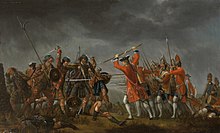This article needs additional citations for verification .(January 2023) |

"Charlie Is My Darling" is the title of a number of traditional Scots songs. [1]
Contents
The first is attributed variously to James Hogg or Carolina Oliphant (Lady Nairne). A second later song of the same name is attributed to Charles Gray.
All known versions of the song refer to the figure of Bonnie Prince Charlie of Scotland (Charles Edward Stuart).
The earlier versions focus on Charles as a patriotic hero of Scotland during the Jacobite revolts of the 18th century, and it describes the arrival of Charles, referred to as "the Young Chevalier", to the Highlands, being received with joy and celebration by the townspeople, who came to his encounter while playing Scottish music and wearing traditional attires, the men getting ready to leave their houses and families to join the revolution. [2]
A later version of the song by Robert Burns contains lyrics that mean to poke fun at Charles' womanizing reputation. [3] Burns' version of the lyrics are, in comparison to the earlier ones, considered to be fairly risquée for the times, [4] with a narrative that alludes to the amorous adventures of Charles with the Scottish women of the towns he visits during his battles.
Eddi Reader has recorded a popular version of this one on her highly regarded CD of Burns' songs.
There is an arrangement by Ludwig van Beethoven, "Charlie is my darling", WoO. 157 (12 songs of various nationalities) no. 3 (1819).
The song is considered to be one of the best known art pieces to represent the Jacobite movements of Scotland. It has also been adapted during the American Civil War as "Johny is my Darling", a variation on Charlie. [5]